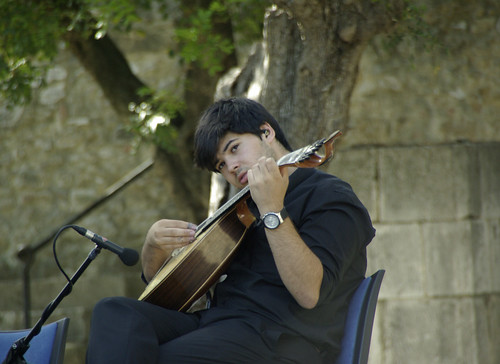 On 27 February 2012--sometime after 8pm Lisbon time--Rádio Amália will be broadcasting something special over the Internet: live fado from Os Ferreiras restaurant in Lisbon (the link is here). The program is expected to include Artur Batalha, Pedro Galveias and Júlia Lopes (among others). I'm waiting to hear from the proprietor, César Ferreira, about the musicians for the evening, but I am sure they will be great.
On 27 February 2012--sometime after 8pm Lisbon time--Rádio Amália will be broadcasting something special over the Internet: live fado from Os Ferreiras restaurant in Lisbon (the link is here). The program is expected to include Artur Batalha, Pedro Galveias and Júlia Lopes (among others). I'm waiting to hear from the proprietor, César Ferreira, about the musicians for the evening, but I am sure they will be great.
This is not a show to be missed. Artur Batalha continues to be in tremendous form (also see this writeup from Jaume). Pedro Galveias has a new record out, and is finding a deeper, perhaps more introspective, style to his singing. Júlia Lopes will keep everyone honest: she is a veteran fado performer, instantly recognizable to anyone who has heard her sing even once. Having said all this, one never knows if the program is going to change!
I am sure that César has some additional surprises in store for the evening. He is really doing honor to the house, which his father ran until his untimely death, and which is where the great Fernando Maurício spent the last ten or so years of his career. The house has also been home to many other great singers, including Jaime Dias. All of this is to say, the singers and musicians know the tradition, so do the clients, and they are true to it.
I am sure that César has some additional surprises in store for the evening. He is really doing honor to the house, which his father ran until his untimely death, and which is where the great Fernando Maurício spent the last ten or so years of his career. The house has also been home to many other great singers, including Jaime Dias. All of this is to say, the singers and musicians know the tradition, so do the clients, and they are true to it.
The idea for transmitting live fado from the fado houses in Lisbon via Rádio Amália is, I believe, the idea of the host, José Gonçalez. He has undertaken a number of innovations on the program after taking it over following the death of Vergílio Pereira. He continues to have fado vadio (impromptu fado) in the studios, plus guests from time to time.
The link to the live feed from Rádio Amália is here.



